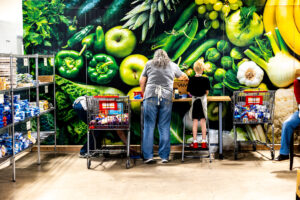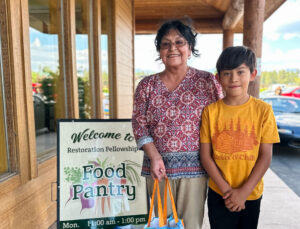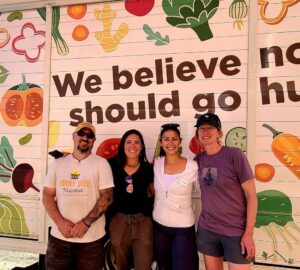What has struck me most in this awareness-raising exercise is the exceptionalism we require of the disadvantaged and working poor. Eking out healthy and filling meals on such a limited budget requires a persistence, dedication and sacrifice that few of us – certainly not me – possess 24-7, 365 days a year, no exception. For example:
– Shopping on a limited budget required a carefully orchestrated meal plan for the whole week. My usually quick zip through the grocery store was three times as long as I compared prices, weighed produced and added up every item to the penny. I lived in fear of being that person in the check-out line forced to decide what to toss back in the basket while others impatiently linger behind me.
– I saved money by eating a mostly vegetarian/vegan diet, but SNAP does not support the supplements such as B-12 and Vitamin D I need as a result of this eating this way.
– My meal plan allowed no opportunity to host friends for a meal at home, to provide a special family birthday or holiday meal, to bring cupcakes to school for a child’s birthday. Tomorrow, as the challenge is over, I will bring a potluck meal to a party – something I could not have been able to figure out how to do during the Challenge.
– All week during the Challenge I’ve had a nagging sinus headache. That made me long for some kind of spicy Asian broth or noodles. Oh, well – I had already purchased my groceries. No wiggle room, no matter how much I desired something else. Again, that’s manageable for me as an adult to deal with, but I can’t imagine having a sick child and not being able to provide her with the ideal comfort food during times of illness because I’ve already used up my benefits.
– The tedium of relying on simple, cheap and filling items (oatmeal, carrots, broccoli, etc.) is fine for a week. But living this way for prolonged periods means missing out on variety, flavors, balance. Pricier produce such as asparagus or blueberries won’t make the cut.
– I worked a few 12-hour days this week – days where normally I would likely pick up Chinese take-out on the way home or pop a prepared frozen dish into the microwave. Getting home at 7, having to stick with the plan to prepare lentils, meant not eating until 8 p.m. That’s fine for me, but wouldn’t be possible for that single mom coming home to hungry kids with bedtime fast approaching. It’s easy to understand why convenience foods become the default choice.
All this week my awareness of food, of hunger, of the intense planning necessary to provide a decent meal on little more than spare change, plus the impossibility of varying from this plan, was ever-present. So many people in our community live with these challenges every day. They do it with more grace than most of us will ever know.





